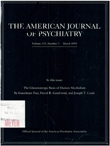Dissociative symptoms in a substance abuse population
Abstract
OBJECTIVE: This study was intended to examine the extent of dissociative experiences that exist within a substance abuse population and to determine how demographic and clinical variables affect these experiences. METHOD: A total of 265 male veterans being treated on an inpatient substance abuse unit completed a standard test battery that included the MMPI-2, the Shipley-Hartford Institute of Living Scale, and the Dissociative Experiences Scale. Additional demographic and clinical information was obtained from the patients' medical records. RESULTS: Over 41% of the cohort had scores on the Dissociative Experiences Scale that suggested the need for further evaluation of a dissociative disorder. A stepwise multiple regression analysis revealed that level of psychological discomfort, IQ, and race accounted for more than 24% of the variance in Dissociative Experiences Scale scores. CONCLUSIONS: Substance abuse populations may need to be routinely screened for dissociative symptoms just as they are for depression and anxiety.
Access content
To read the fulltext, please use one of the options below to sign in or purchase access.- Personal login
- Institutional Login
- Sign in via OpenAthens
- Register for access
-
Please login/register if you wish to pair your device and check access availability.
Not a subscriber?
PsychiatryOnline subscription options offer access to the DSM-5 library, books, journals, CME, and patient resources. This all-in-one virtual library provides psychiatrists and mental health professionals with key resources for diagnosis, treatment, research, and professional development.
Need more help? PsychiatryOnline Customer Service may be reached by emailing [email protected] or by calling 800-368-5777 (in the U.S.) or 703-907-7322 (outside the U.S.).



